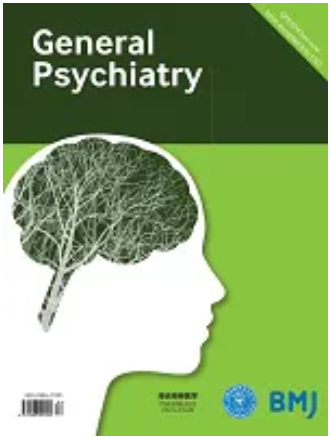影响护士反刍思维行为的因素:一项针对一家三级医院 858 名受试者的横断面研究
IF 5.3
3区 医学
Q1 PSYCHIATRY
引用次数: 0
摘要
致编辑:护士为患者提供直接的医疗护理,在医疗保健领域发挥着重要作用,她们的心理健康对服务质量和患者满意度有着重大影响。1 反刍思维包括对负面情绪、其原因和后果的反复思考。护士的这种常见心理行为会严重影响其自我评价,并导致其产生无价值感。2 然而,在影响执业护士反刍思维的风险因素方面还存在知识空白。反刍性思维与共情、社会支持和寻求反馈行为等心理过程有关。3 社会支持包括个人从其社会网络中获得的心理和物质援助。充分的社会支持有助于增强个人的自尊和保持心理健康。4 我们假设,执业护士的特定个人和职业风险因素与这些心理过程和反刍思维密切相关。通过研究执业护士反刍思维的现状及其相关因素,我们旨在填补知识空白,并为这一重要心理状况的潜在干预措施奠定基础。本研究在一个繁忙的三级医院进行,该医院拥有 2000 多张病床,护士与病人的比例约为 1:10,位于一个人口超过 800 万的城市。调查使用问卷星应用程序分发。调查方法已告知各护理单元的护士长。然后,护士长在发放问卷之星二维码之前,在集中学习或培训课程中向符合条件的护士解释这些细节。所有参与者都了解了...本文章由计算机程序翻译,如有差异,请以英文原文为准。
Factors influencing ruminative thinking behaviours in nurses: a cross-sectional study of 858 subjects in a tertiary care hospital
To the editor: Nurses play a vital role in healthcare by providing direct medical care to patients, and their mental well-being significantly impacts the quality of service and patient satisfaction.1 Ruminative thinking involves repetitive thoughts about negative feelings, their causes and consequences. This common psychological behaviour in nurses can significantly impact their self-evaluation and result in feelings of worthlessness.2 However, there is a knowledge gap regarding the risk factors influencing ruminative thinking in practising nurses. Ruminative thinking has been linked to psychological processes such as empathy, social support and feedback-seeking behaviours. Empathy is crucial for the quality of care, a positive nurse–patient relationship and reducing medical disputes.3 Social support encompasses the psychological and material assistance that individuals receive from their social networks. Adequate social support contributes to bolstering an individual’s self-esteem and maintaining psychological well-being. Feedback-seeking behaviour is an active psychological approach through which individuals seek valuable information to modify their behaviours and achieve personal and professional objectives.4 We hypothesised that practising nurses have specific personal and professional risk factors that are integrally associated with these psychological processes and ruminative thinking. By examining the current state of ruminative thinking in practising nurses and its associated factors, we aimed to fill the knowledge gap and provide a foundation for potential interventions for this important psychological condition. This study was conducted in a busy tertiary hospital with over 2000 beds and a nurse-to-patient ratio of approximately 1:10, in a city with a population of over 8 million. The survey was distributed using the Questionnaire Star application. The survey method was communicated to the head nurses of each nursing unit. The head nurses then explained these details to eligible nurses during focused learning or training sessions before distributing the Questionnaire Star QR code. All participants were made aware of the …
求助全文
通过发布文献求助,成功后即可免费获取论文全文。
去求助
来源期刊

General Psychiatry
医学-精神病学
CiteScore
21.90
自引率
2.50%
发文量
848
期刊介绍:
General Psychiatry (GPSYCH), an open-access journal established in 1959, has been a pioneer in disseminating leading psychiatry research. Addressing a global audience of psychiatrists and mental health professionals, the journal covers diverse topics and publishes original research, systematic reviews, meta-analyses, forums on topical issues, case reports, research methods in psychiatry, and a distinctive section on 'Biostatistics in Psychiatry'. The scope includes original articles on basic research, clinical research, community-based studies, and ecological studies, encompassing a broad spectrum of psychiatric interests.
 求助内容:
求助内容: 应助结果提醒方式:
应助结果提醒方式:


